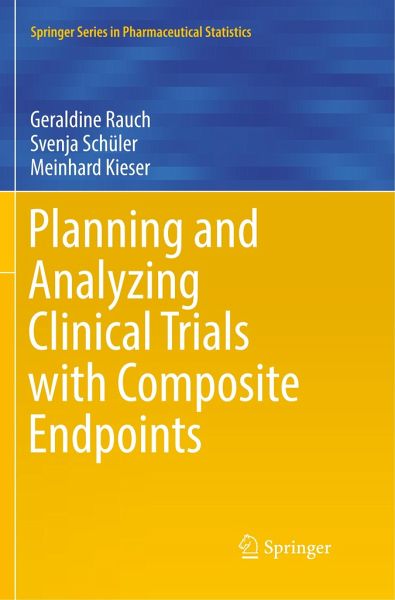
Planning and Analyzing Clinical Trials with Composite Endpoints
Versandkostenfrei!
Versandfertig in 6-10 Tagen
106,99 €
inkl. MwSt.
Weitere Ausgaben:

PAYBACK Punkte
53 °P sammeln!
This book addresses the most important aspects of how to plan and evaluate clinical trials with a composite primary endpoint to guarantee a clinically meaningful and valid interpretation of the results. Composite endpoints are often used as primary efficacy variables for clinical trials, particularly in the fields of oncology and cardiology. These endpoints combine several variables of interest within a single composite measure, and as a result, all variables that are of major clinical relevance can be considered in the primary analysis without the need to adjust for multiplicity. Moreover, co...
This book addresses the most important aspects of how to plan and evaluate clinical trials with a composite primary endpoint to guarantee a clinically meaningful and valid interpretation of the results. Composite endpoints are often used as primary efficacy variables for clinical trials, particularly in the fields of oncology and cardiology. These endpoints combine several variables of interest within a single composite measure, and as a result, all variables that are of major clinical relevance can be considered in the primary analysis without the need to adjust for multiplicity. Moreover, composite endpoints are intended to increase the size of the expected effects thus making clinical trials more powerful.
The book offers practical advice for statisticians and medical experts involved in the planning and analysis of clinical trials. For readers who are mainly interested in the application of the methods, all the approaches are illustrated with real-world clinical trial examples, and the software codes required for fast and easy implementation are provided. The book also discusses all the methods in the context of relevant guidelines related to the topic. To benefit most from the book, readers should be familiar with the principles of clinical trials and basic statistical methods.
The book offers practical advice for statisticians and medical experts involved in the planning and analysis of clinical trials. For readers who are mainly interested in the application of the methods, all the approaches are illustrated with real-world clinical trial examples, and the software codes required for fast and easy implementation are provided. The book also discusses all the methods in the context of relevant guidelines related to the topic. To benefit most from the book, readers should be familiar with the principles of clinical trials and basic statistical methods.












